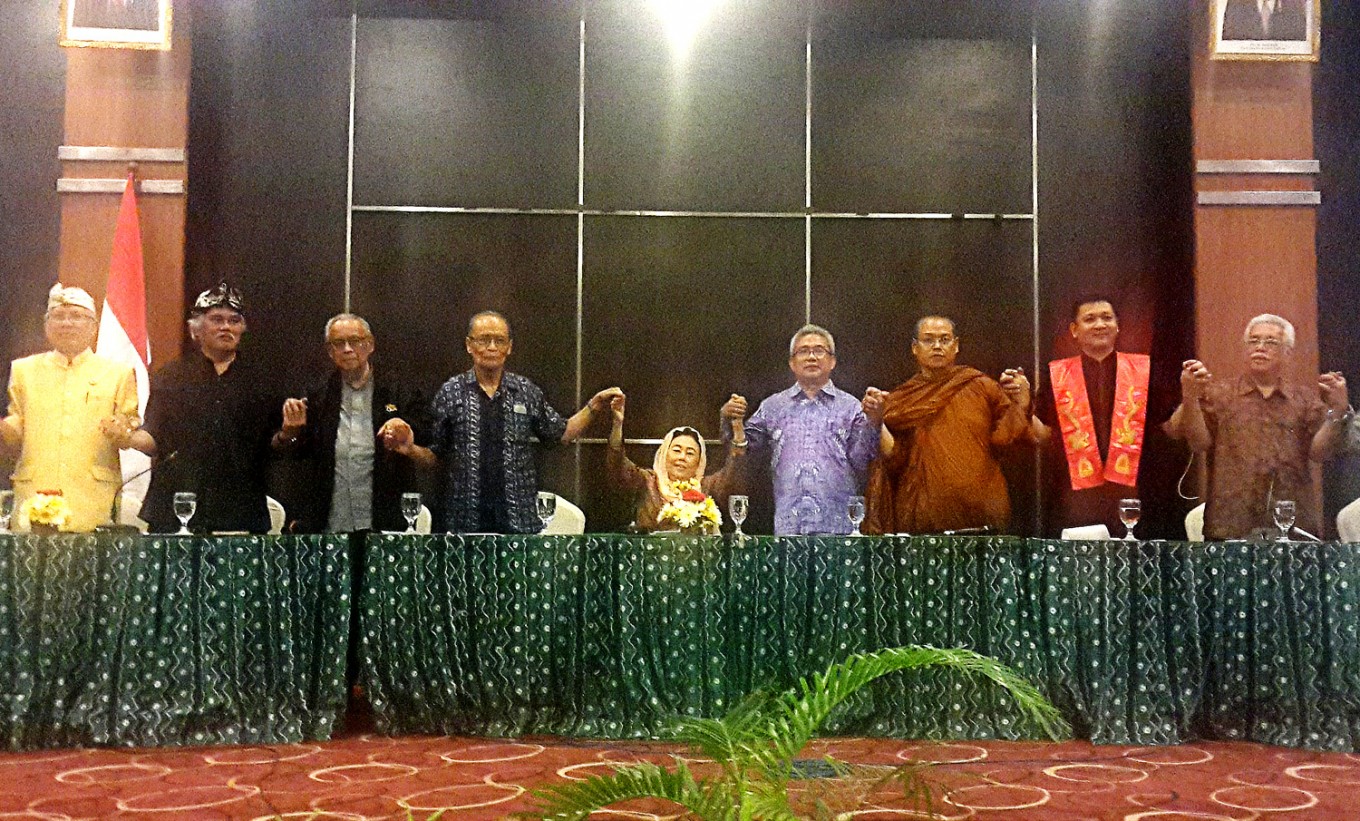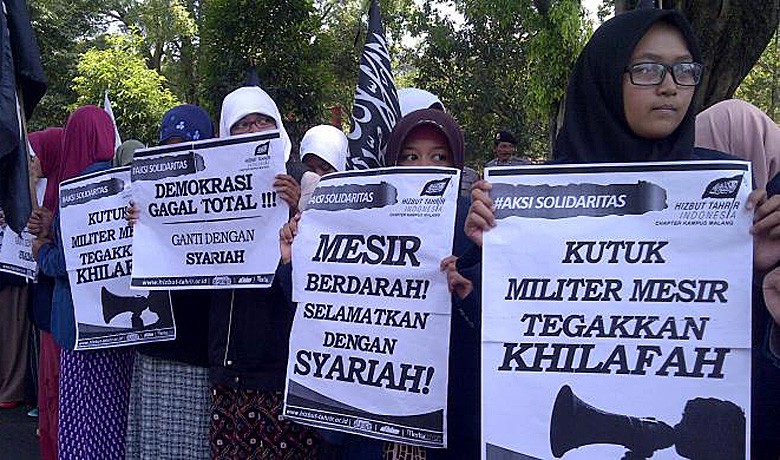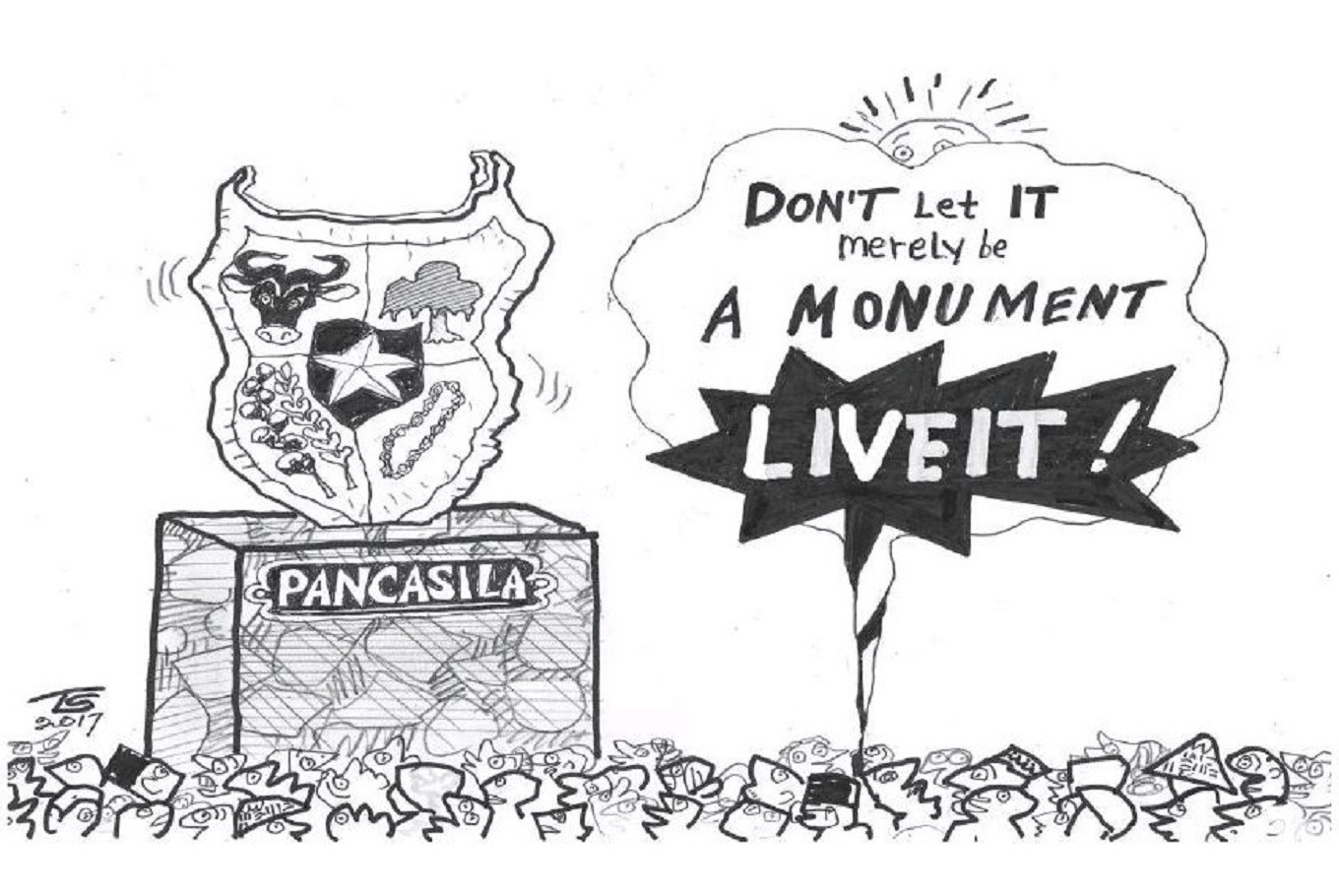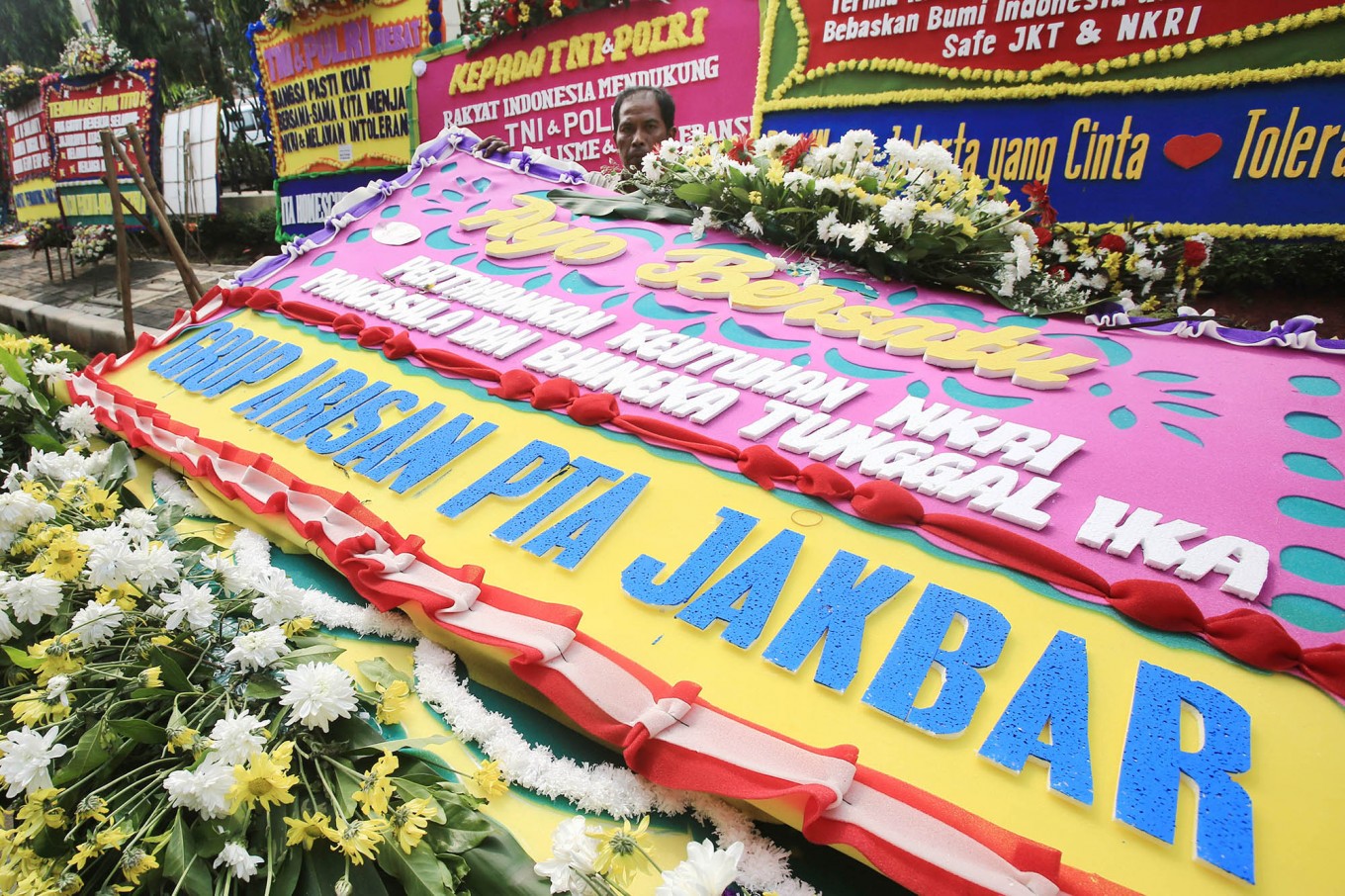Popular Reads
Top Results
Can't find what you're looking for?
View all search resultsPopular Reads
Top Results
Can't find what you're looking for?
View all search resultsPledges for Pancasila renewed as bigotry haunts nation
The government’s decision to make Pancasila Day, which falls every June 1, a national holiday could not be more appropriate.
Change text size
Gift Premium Articles
to Anyone
 For peace and harmony: Indonesia’s religious leaders gather at Gadjah Mada University in Yogyakarta on May 26 to call on the government to take tougher actions against intolerant groups promoting ideas and carrying out actions that contravene Pancasila. They include Shinta Nuriyah Abdurrahman Wahid (center), Syafi’i Maarif, Rev. Gomar Gultom and Cardinal Julius R.Darmaatmadja. (JP/Bambang Muryanto)
For peace and harmony: Indonesia’s religious leaders gather at Gadjah Mada University in Yogyakarta on May 26 to call on the government to take tougher actions against intolerant groups promoting ideas and carrying out actions that contravene Pancasila. They include Shinta Nuriyah Abdurrahman Wahid (center), Syafi’i Maarif, Rev. Gomar Gultom and Cardinal Julius R.Darmaatmadja. (JP/Bambang Muryanto)
The government’s decision to make Pancasila Day, which falls every June 1, a national holiday could not be more appropriate.
With intolerance rising and the call for the creation of a global Islamic caliphate gaining traction even at the nation’s state universities, those who believe the state ideology—formulated by the nation’s founding fathers in 1945—can no longer stay silent and have begun to stand up for it.
Pancasila, proposed by first president Sukarno as the national consensus that could unify millions of Indonesians regardless of their beliefs and ideologies, is essentially the belief in one God, humanity, unity, consensus and social justice. It is then simply understood as an ideology of tolerance.
 Against Pancasila: Female members of hard-line Islamic organization Hizbut Tahrir Indonesia (HTI) stage a rally to promote the establishment of an Islamic caliphate in Malang, East Java. (Kompas.com/File)
Against Pancasila: Female members of hard-line Islamic organization Hizbut Tahrir Indonesia (HTI) stage a rally to promote the establishment of an Islamic caliphate in Malang, East Java. (Kompas.com/File)
For many, Pancasila is the final consensus and further debate over its compatibility is unnecessary.
Seasoned lawyer Todung Mulya Lubis, for instance, said he and his fellow advocates would take part in the effort to protect the nation’s unity by promoting Pancasila. “Pancasila is our ultimate solution. There should be no compromise when it comes to Pancasila,” he said recently.
On Monday, hundreds of lawyers grouped under the Indonesian Advocates Association (Peradi) pledged their support for Pancasila, which literally means five principles. As professionals, the lawyers said they bore the responsibility to protect the national ideology.
“There are some groups who try to disturb the national ideology of Pancasila. They want to mess around with our diversity,” Peradi chairman Juniver Girsang.
 A meaningful dialogue is required to help the country regain the genuine values of Pancasila as a way to draw a new social contract — something missing after the New Order.(JP/File)
A meaningful dialogue is required to help the country regain the genuine values of Pancasila as a way to draw a new social contract — something missing after the New Order.(JP/File)
Lawyers are not the only profession feeling the need to renew their pledge of support for Pancasila.
A group of Anthropologists calling themselves Anthropologist Movement for Indonesia has expressed to President Joko “Jokowi” Widodo that Indonesia’s diversity is at risk, as people who do not share Pancasila values are now becoming more assertive and dominant.
“Our unity in diversity is under threat. We are concerned about this situation and we want the President to know. We, anthropologists, believe that Indonesia should be a pluralist nation that respects all people no matter their religion, ethnicity and political views,” the group’s spokesman, Yando Zakaria, said in a meeting with Jokowi at the State Palace on the same day.
Among the anthropologists attending the meeting were Meutia F. Sarwono, P.M Laksono, Amri Marzali, Iwan Meulia Pirous and Kartini Sjahrir.
“We have discussed the current situation in Indonesia in the past few months and we have come to the conclusion that Indonesia is under the threat of rising intolerance,” Yando added.
 Hundreds of flower boards pleading with the Indonesian Military and the National Police to uphold Pancasila and the Constitution are seen along the sidewalks in front of the National Police headquarters on Jl. Trunojoyo in South Jakarta on Wednesday.(JP/Dhoni Setiawan)
Hundreds of flower boards pleading with the Indonesian Military and the National Police to uphold Pancasila and the Constitution are seen along the sidewalks in front of the National Police headquarters on Jl. Trunojoyo in South Jakarta on Wednesday.(JP/Dhoni Setiawan)
The leader of Muhammadiyah’s youth wing, Dahnil Anzar Simanjuntak, concurred with the professionals. “This is not the time to challenge and contradict Pancasila. Indonesia has agreed to make Pancasila a symbol of the country’s diversity. No group should feel more superior to others,’’ he said.
The anthropologists have called on Jokowi to act fast and tough on intolerant groups.
The President has said he will gebuk (clobber) intolerant groups who seek to replace or act against Pancasila values and the Constitution. The term gebuk, analysts said, showed that Jokowi had taken the threat against Pancasila seriously. However, critics said Jokowi’s choice of word could bring the specter of authoritarianism back to the country.
During the Pancasila Day ceremony on Thursday, Jokowi emphasized that the country had no option but to realize that Pancasila was a gift God had given and all people must maintain unity and tolerance.
The internet–savvy President previously released a video blog titled I am Indonesia, I am Pancasila in his attempt to reach to millennials and remind them of the importance of safeguarding the national ideology. (ary)
Historical milestones in Indonesia’s Pancasila
1942: Indonesia formally under Japanese occupation
March 1, 1945: Agency for the Preparatory Work for Indonesian Independence (BPUPKI) is founded to prepare for the nation's independence from Japan.
May 28, 1945: The BPUPKI holds a meeting on state formation and ideology
June 1, 1945: Sukarno gives a speech on state ideology, titled “The Birth of Pancasila”.
June 22, 1945: Pancasila is included in the Jakarta Charter. The first verse faces criticism from non-Muslim leaders since it includes “responsibility to implement sharia for its believers”, which is deemed as non-inclusive.
August 18, 1945: Pancasila is included in the preamble of the Constitution. The first verse now only states “belief in one and only God'
Sept. 30, 1965: Several army generals are kidnapped and killed. The Indonesian Communist Party (PKI) is blamed for attempting a coup to replace Pancasila with communism.
Oct. 1, 1965: The Army and Soeharto take control amid chaos to stabilize the nation.
March 11, 1966: Supersemar letter is issued, gives authority to Soeharto to take control of the government.
July 5, 1966: The PKI is disbanded and the teaching of communism is prohibited.
Sept. 27, 1967: Oct. 1 is recognized as Pancasila Sanctity Day.
March 27, 1968: Soeharto is given a formal mandate as president by the People’s Consultative Assembly (MPR), official start of the New Order
March 22, 1978: MPR decrees P4, nationwide indoctrination of Pancasila through educational institutions, rejects Nahdatul Ulama's faction in the state-forged United Development Party (PPP)
March 9, 1983: Tap MPR No II/MPR/1983 further cements Pancasila’s position as the basis of state development.
June 17, 1985: Law on mass organizations passed, stipulating Pancasila as the sole basis of all mass organizations, including Islamic organizations.
May 21, 1998 Soeharto resigns, marking the end of the New Order and start of the Reform Era.
April 29, 1999: Official withdrawal of P4 indoctrination.
June 1, 2016: Pancasila Day is recognized as a public holiday by President Joko "Jokowi" Widodo.
May 29 to June 4, 2017: Pancasila week, themed "Saya Indonesia, Saya Pancasila” (I am Indonesia, I am Pancasila). (dev)









